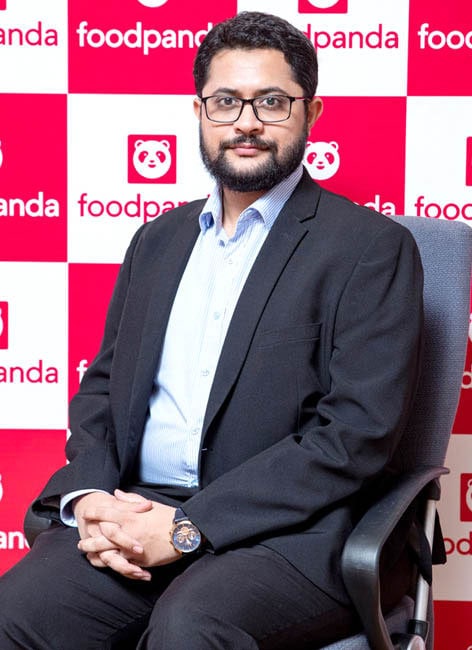Ibad Ur Rehman Ahmed, Director Q-commerce& New Verticals
COVID hit Pakistan in the first quarter of 2020. It was a time of great uncertainty and complex change. Life, as we knew it, was no more, and protecting self and others meant that exceptional measures had to be taken. They say, “Necessity is the mother of invention” and that it was – seeing how mobility and even access to essentials had become restricted, foodpanda, the market leader for food delivery in Pakistan, chose to start e-grocery delivery for the first time.
In the beginning, the mechanism was quite similar to how we worked with our restaurant partners. We started partnering with recognized grocery and other essential retailers. A consumer would place an order to a retailer they trusted and our rider would reach out to collect the order and drop it off at the location specified by the customer. One of the obvious challenges of this model was the difficulty in scaling system integrations with multiple retailers. As a result of this, there were inventory errors, with customers placing orders of items that were no longer available, and this was not very conducive to the consumer journey.
We started toying with the idea of bringing the dark store model to Pakistan. This was something that foodpanda had already started to do in other APAC countries, whereby, we managed the end-to-end process of sourcing the product, managing the inventory, running the warehousing and store operations, dispatching, and running the last mile. This new model was branded “pandamart”
This was easier said than done. There were established entrants in the e-grocery space; be it Daraz, Airlift, GrocerApp, HumMart, etc. Despite that, adoption and trust in this new channel remained a challenge – how and why would consumers order from a mart that they have not physically been to and shopped from, especially when they haven’t seen or touched the product? But the largest challenge by far remained convincing Consumer Packaged Goods (CPG) brands to believe in the potential and the viability of a relatively untested model when they hadn’t seen any volumes whatsoever so that we could commence sourcing from them.
After thinking through the working of the model, tons of hustle, and many sleepless nights, the first pandamart dark store was launched in Karachi in the November of 2020, with about 20 stores launched in Karachi and Hyderabad between November 2020 and January 2021. The twin cities launch followed next, followed by Lahore in June 2021. By the end of last year, we added close to 50 stores across 6 cities in Pakistan.
Roundabout Q4 2021, we made certain critical choices around its business models. This was a time when a lot of FDI was being pumped into local startups but pandamart chose the route of sustainable, profitable growth over growth at all costs model. We decided that it was important to focus on service fundamentals and to charge a certain premium for convenience as opposed to buttressing deal-seeking behavior and price arbitrage.
At the same time, we galvanized our original shops/retailer partnership model into a proper hyperlocal marketplace from where you could order anything within 4-6 KMs, almost like shopping from a virtual mall. The marketplace model also allowed us to offer variety and choice as well as price comparisons with our pandamarts. These model optimizations ensured that we remained a going concern in the face of tough macroeconomic conditions in 2022 that impacted multiple technology businesses.
In 2022, leveraging on our procurement capabilities, we also tapped into B2B for corporate pantry and consumable needs as well as into vertical integration for meeting the sourcing needs of our restaurant and home chef partners. Tapping into such adjacencies is truly the kind of entrepreneurial spirit that makes us foodpanda. It allows us to create value for our partners by lowering their cost of operations in a way such that the whole ecosystem derives benefit from it and we can also pass on the created value, down to the end consumer.
In a sense, what I am most proud of is not, what we have been able to build and accomplish but how we chose to do it. E.g. we understood that enabling trust in this channel, especially for fruits, vegetables, and meat would be a challenge, so we got our central warehouse operations for these products “HACCP” certified, which is a certification for the sourcing, handling, storage and dispatch of food products. Similarly, to reduce our reliance on the country’s electric grids, we have started moving our marts to solar power, so that at least partially, we consume from what we generate.
In terms of sustainability, we chose to be the first retailer in Pakistan to provide products in unwoven, cloth bags across Pakistan, regardless of whether provincial regulation required us to do so or not. Additionally, we work with like-minded partners, who value impacts on the environment and the societies that we operate in, so we continue to work with them on flood relief, tree plantations, hygiene drives, improving diversity in the workplace, and on standing up against street harassment.
What started as a small opportunity to provide convenience during the pandemic has burgeoned into three businesses, with more to follow in due course.









